In a world increasingly concerned with food security, sustainability, and ethical practices, small-scale meat farming is gaining recognition for its role in providing locally sourced, high-quality meat. These farms, often operated by passionate individuals or families, prioritize animal welfare, environmental sustainability, and community engagement.
The Rise of Small-Scale Meat Farming
Small-scale meat farming has experienced a notable surge in recent years, as consumers become more discerning about the origin and production methods of their food. According to industry reports, the number of small-scale meat farms has grown by 30% in the past decade, reflecting a shift towards sustainable and locally sourced meat options.
Of course, the first major step to starting your boutique meat farm is to select your type and breed of meat. Are you thinking of cows, goats or pigs? And which specific breed do you have in mind?
Selecting the right type and breed is extremely important. Hopefully, this article will help you.
- Small-scale meat farms account for approximately 20% of the overall meat production in many countries.
- These farms typically have an average herd size of 10-50 animals, allowing for personalized care and attention to each animal's needs.
- Studies show that small-scale meat farms have a significantly lower carbon footprint compared to large-scale industrial operations due to their focus on sustainable practices and reduced transportation distances.
Choosing the Right Cow Breeds for Small-Scale Meat Farming: Angus, Hereford, and Red Devon
If your boutique meat farm is going to specialize in beef, you have to choose the right breed of cow. This choice can quickly become one of those pivotal decisions that may just inevitably determine your success.
Three popular breeds known for their exceptional meat quality, adaptability to pasture-based systems, and ease of management are Angus, Hereford, and Red Devon. Let’s take a closer look at each of these breeds individually and explore why they make excellent choices for small-scale meat farming operations.
Angus
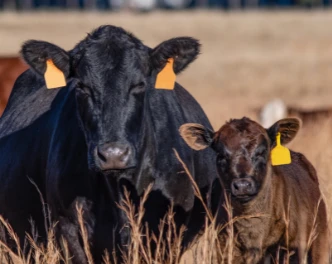
Angus cattle, also known as Aberdeen Angus, have gained a reputation for their superior meat quality. These black-hided cattle are highly regarded for their marbling, tenderness, and flavorful beef. They thrive in pasture-based systems, adapting well to different climates and forage conditions.
Lower Cost on Average Over Other Breeds
Angus cattle are known for their efficient feed conversion, meaning they can convert pasture and forage into meat effectively. This translates to potentially lower feed costs and better profitability for small-scale farmers.
High-Quality, Popular Meat Production
Angus cattle exhibit excellent meat production qualities, producing high-quality carcasses with well-marbled, tender beef. Their ability to finish on grass alone or with minimal grain supplementation makes them well-suited for pasture-based systems.
Meat That Is Know for Marbling
Angus beef is renowned for its marbling, which adds flavor and tenderness to the meat. This marbling also contributes to juiciness, making Angus beef a favorite among consumers.
Calm and Gentle Giants
Angus cattle are generally docile and easy to handle, making them suitable for small-scale operations where ease of management is essential.
Hereford
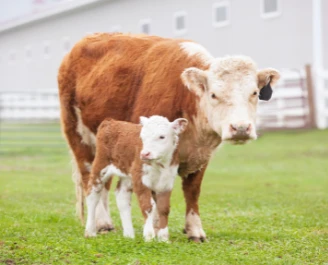
Hereford cattle have a long-standing history as a versatile breed known for their adaptability and excellent meat characteristics. With their distinctive red body and white face, Herefords are well-suited to a range of climates and grazing conditions.
A Breed That Rarely Requires Intensive Feeding
Herefords are known for their efficiency in converting forage into meat, making them an economical choice for small-scale meat farming. Their ability to thrive on grass-based diets reduces the need for intensive feeding.
They Produce High-Quality Meat
Hereford cattle are renowned for their robust meat production. They produce well-marbled beef with good muscle development, resulting in flavorful cuts.
Meat That Is Known To Be Tender
Hereford beef is highly regarded for its taste, tenderness, and juiciness. The balanced marbling contributes to the meat’s rich flavor and enhances the dining experience.
Easily Manageable and Friendly
Herefords are generally calm and docile, making them easy to handle and manage. Their gentle nature can be beneficial for small-scale farmers who prefer working with more manageable animals.
Red Devon
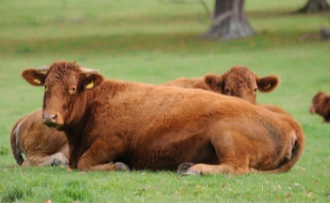
Red Devon cattle, originating from southwestern England, have a long history of being well-adapted to grazing systems. These hardy animals are known for their efficiency, adaptability, and ability to thrive on grass-based diets.
Frequently Offers Lower Feed Costs
Red Devon cattle are excellent foragers, efficiently converting grass and forage into meat. This attribute can result in lower feed costs and improved profitability for small-scale meat farming operations.
Chef’s Love The Marbling and Tenderness
Red Devon cattle produce high-quality beef with excellent marbling, tenderness, and flavor. Their ability to efficiently convert forage into meat ensures a consistent supply of quality beef.
Regarded For Flavor
Red Devon beef is highly regarded for its tenderness, succulence, and exceptional flavor. The well-marbled meat delivers a rich and satisfying eating experience.
Easy To Work With
Red Devon cattle are known for their calm and gentle nature, making them easy to handle and work with, particularly in smaller-scale operations where close interaction with the animals is common.
Best Goat Breeds for Small-Scale Meat Farms: Boer, Kiko, and Spanish Goats
When it comes to small-scale meat farming with goats, choosing the right breeds is essential for success. Heritage breeds such as Boer, Kiko, and Spanish goats are particularly well-suited for this purpose. These breeds offer robustness, favorable meat-to-bone ratio, and adaptability to various environments.
Let’s explore each of these breeds in more detail and understand why they are excellent choices for small-scale meat farming operations.
Boer
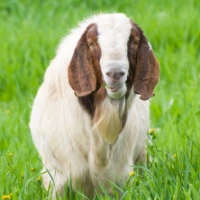
Boer goats are widely recognized for their exceptional meat production qualities. Originating from South Africa, they have gained popularity worldwide due to their robustness and excellent meat characteristics.
Meat Production: Boer goats are renowned for their rapid growth rate and impressive meat-to-bone ratio. They yield a high percentage of lean, flavorful meat, making them a top choice for meat-focused operations.
Adaptability: Boer goats exhibit excellent adaptability to various climates and environments, including harsh and arid conditions. They are resilient and can thrive in both pasture-based systems and more intensive management settings.
Temperament: Boer goats have a docile and friendly nature, which makes them relatively easy to handle. This temperament is particularly advantageous for small-scale farmers who may have limited experience or resources for handling more challenging livestock.
Kiko
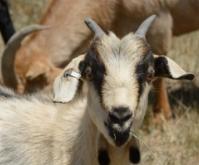
Kiko goats, originating from New Zealand, were specifically bred for their hardiness, adaptability, and meat production qualities. They excel in foraging and are known for their excellent maternal instincts.
Meat Production: Kiko goats are renowned for their efficient meat production and favorable meat-to-bone ratio. They possess good muscling, resulting in high-quality, flavorful meat.
Adaptability: Kiko goats are highly adaptable to various environments and grazing conditions. They have a natural resistance to parasites, making them suitable for pasture-based systems and reducing the need for extensive veterinary interventions.
Temperament: Kiko goats have a calm and independent disposition, which contributes to their adaptability and ease of management. They are known for their self-reliance and ability to thrive with minimal intervention.
Spanish
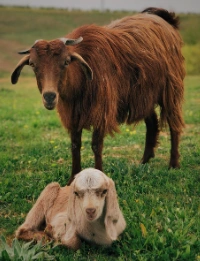
Spanish goats, often referred to as brush or scrub goats, are a heritage breed known for their hardiness, versatility, and adaptability to diverse environments. They have a long history in the United States and offer unique benefits for small-scale meat farming.
Meat Production: Spanish goats yield flavorful meat with a good meat-to-bone ratio. While they may have smaller frame sizes compared to some other breeds, their meat is highly sought after for its tenderness and distinct flavor.
Adaptability: Spanish goats have exceptional adaptability and resilience. They are known for their browsing and foraging capabilities, making them well-suited for grazing in rugged terrains or areas with dense vegetation.
Temperament: Spanish goats have an independent and resourceful nature, which contributes to their adaptability and low-maintenance requirements. They are generally hardy, able to withstand harsh climates and minimal feeding interventions.
Best Pig Breeds for Small-Scale Meat Farms: Berkshire, Tamworth, and Gloucestershire Old Spot
When it comes to small-scale meat farming with pigs, choosing the right breeds is essential for success. Berkshire, Tamworth, and Gloucestershire Old Spot are renowned heritage pig breeds that are favored by small-scale farmers for their exceptional meat quality, foraging abilities, and docile temperament. Let’s delve into each of these breeds in more detail and understand why they are excellent choices for small-scale meat farming operations.
Berkshire
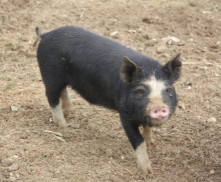
Berkshire pigs, also known as Kurobuta, have a long-standing reputation for their superior meat quality. Originating from England, they are known for their marbling, tenderness, and rich flavor.
Meat Quality: Berkshire pork is highly sought after for its well-marbled, juicy meat. The marbling enhances the flavor and tenderness, making it a favorite among chefs and consumers alike.
Foraging Abilities: Berkshire pigs have excellent foraging instincts and are well-suited for pasture-based systems. They have a natural inclination to root and search for food, which can contribute to their overall well-being and reduce feeding costs.
Temperament: Berkshire pigs have a docile and friendly temperament, making them relatively easy to handle. Their calm disposition can be advantageous for small-scale farmers, especially those who may have limited experience or resources for handling more challenging pig breeds.
Tamworth
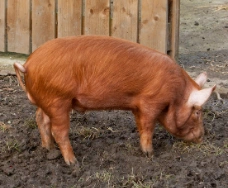
Tamworth pigs are an ancient and hardy breed originating from the United Kingdom. They are known for their distinct reddish-brown coat and exceptional foraging abilities.
Meat Quality: Tamworth pork is valued for its rich, flavorful meat. The meat is often praised for its succulence, tenderness, and depth of flavor, making it a favorite choice for pork enthusiasts.
Foraging Abilities: Tamworth pigs are exceptional foragers and have a natural inclination to graze and root. They are adept at utilizing pasture and forage, reducing reliance on intensive feeding and lowering input costs.
Temperament: Tamworth pigs are known for their intelligence and independent nature. While they may be more spirited than some other breeds, they can still be managed effectively with proper handling and care.
Gloucestershire Old Spot
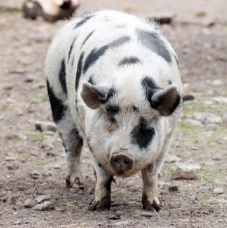
Gloucestershire Old Spot pigs, also known as “Spots,” are a heritage breed originating from England. They are characterized by their white coat adorned with distinctive black spots.
Meat Quality: Gloucestershire Old Spot pork is renowned for its excellent meat quality. The meat is well-marbled, tender, and flavorful, delivering a delightful dining experience.
Foraging Abilities: Gloucestershire Old Spot pigs have strong foraging instincts and adaptability to pasture-based systems. They are skilled at rooting and grazing, which allows them to utilize a variety of vegetation and forage.
Temperament: Gloucestershire Old Spot pigs are known for their docile and friendly temperament. They are generally calm and amiable, making them easier to handle and manage, especially for small-scale farmers.
Conclusion
In conclusion, selecting the right breeds for small-scale meat farming is a crucial decision that can significantly impact the success and profitability of your operation.
Throughout this article, we have explored some of the best breeds for different livestock categories, including cows, goats, and pigs.
These breeds have been carefully chosen based on their exceptional meat quality, adaptability to pasture-based systems, and ease of management.
For small-scale beef farming, breeds like Angus, Hereford, and Red Devon offer a winning combination of meat quality, adaptability, and docile temperaments.
These breeds not only produce high-quality beef, but also thrive in various environments, making them suitable for small-scale operations with limited resources.
When it comes to goats, heritage breeds such as Boer, Kiko, and Spanish goats shine as top choices. Their robustness, adaptability, and favorable meat-to-bone ratio make them ideal for small-scale meat farming.
Whether it’s the rapid growth rate of Boer goats, the efficient meat production of Kiko goats, or the browsing capabilities of Spanish goats, each breed brings unique advantages to the table.
In the realm of pigs, Berkshire, Tamworth, and Gloucestershire Old Spot are renowned heritage breeds that small-scale farmers can rely on.
These breeds consistently deliver exceptional meat quality, exhibit strong foraging abilities, and boast docile temperaments.
Whether you prefer the marbled and tender pork of Berkshire pigs, the rich flavor and foraging instincts of Tamworth pigs, or the well-marbled and friendly demeanor of Gloucestershire Old Spot pigs, these breeds will meet the demands of your small-scale meat farming enterprise.
Ultimately, the success of your small-scale meat farming operation hinges on the careful selection of breeds that align with your goals, resources, and target market.
By considering factors such as meat quality, adaptability, temperament, and ease of management, you can make informed decisions that will contribute to the sustainability and profitability of your venture.
Remember, small-scale meat farming is not just a business; it’s a way of life that fosters a deeper connection to the land, the animals, and the community.
As you embark on this journey, embrace the passion, dedication, and hard work that it demands.
By choosing the best breeds for your specific needs and providing them with the care and attention they deserve, you can create a sustainable and fulfilling small-scale meat farming operation that brings joy to your customers and pride to your heart.















